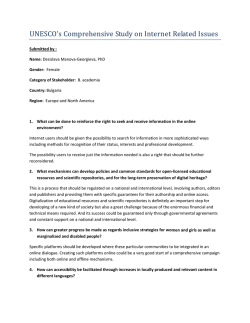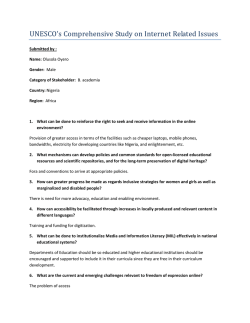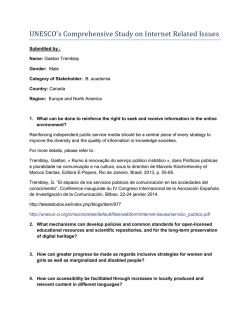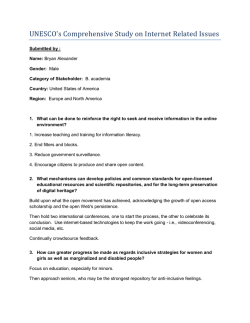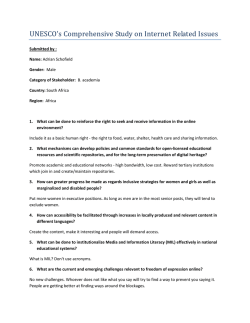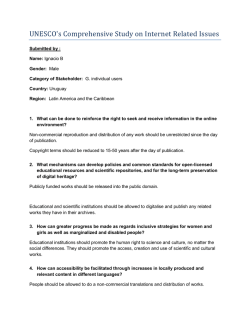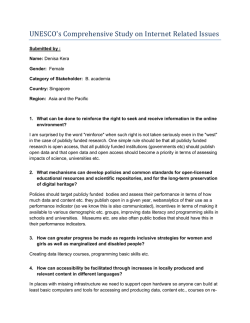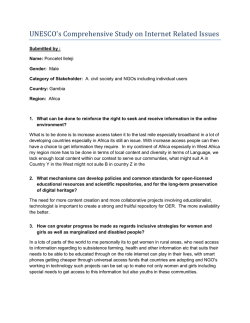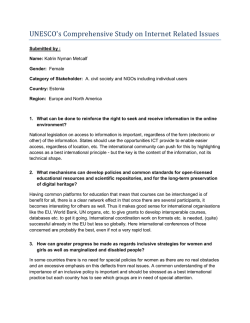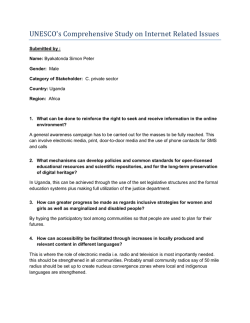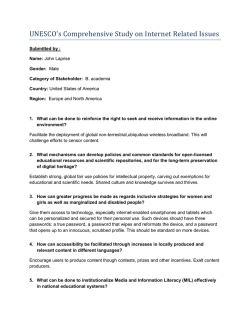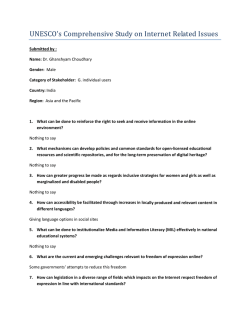
Claudio Menezes
UNESCO's Comprehensive Study on Internet Related Issues Submitted by : Name: Claudio Menezes Gender: Male Category of Stakeholder: B. academia Country: Brazil Region: Latin America and the Caribbean 1. What can be done to reinforce the right to seek and receive information in the online environment? Since TV is the most widespread media, it should be further used to offer and collect information. 2. What mechanisms can develop policies and common standards for open-licensed educational resources and scientific repositories, and for the long-term preservation of digital heritage? Open-licenced educational and scientific repositories should be connected to educational programs at all levels. Otherwise the will servo only to leisure activities. As regards long-term preservation of digital heritage, information owners should submit digital copies to national and international libraries to ensure its preservation. 3. How can greater progress be made as regards inclusive strategies for women and girls as well as marginalized and disabled people? Greater process will achieved through income increase of these target groups. However, libraries, archives and museums are excellent entry points for inclusive information strategies. These institutions should be equipped with information infrastructure e develop inclusive programs for these target groups. 4. How can accessibility be facilitated through increases in locally produced and relevant content in different languages? The formal education system is an excellent basis for production of contents in different languages. Of course, a language enabling environment must be build up to allow the production and sharing of local content. 5. What can be done to institutionalize Media and Information Literacy (MIL) effectively in national educational systems? Midia and Information Literacy (MIL) should be includes in national educational systems. Some Universities have already launched programs of information literacy for their communities. 6. What are the current and emerging challenges relevant to freedom of expression online? It is essential to encourage community midia and social networks. Traditional media is not interested in freedom of expression. 7. How can legislation in a diverse range of fields which impacts on the Internet respect freedom of expression in line with international standards? Some countries are adopting the concepts of neutrality on the Internet. It is a good start as regards freedom of expression on the Net. 8. Is there a need for specific protections for freedom of expression for the Internet? The concept of neutrality is the best safeguard to ensure truem freedom of expression for the Internet. No control by private companies should be allowed to content dissemination on the Net. 9. To what extent do laws protect digitally interfaced journalism and journalistic sources? This is a topic which deserves further analysis. However, in principle all laws protecting journalistic sources should be maintained within and beyond Internet. 10. What are the optimum ways to deal with online hate speech? How can Media and Information Literacy empower users to understand and exercise freedom of expression on the Internet? A legal framework should be discussed and stablished in each country. In principle, human rights convention should be the parameters for such legal framework. 11. What are the optimum systems for independent self-regulation by journalistic actors and intermediaries in cyberspace? Self-regulation does not work. Regulation should be established by parliaments and include democratic framework in the interest of society and human rights. Institutions running only with commercial interest are not appropriate to lead regulation issues. 12. What principles should ensure respect for the right to privacy? The right to privacy is an utmost principle of democratic societies. The following principles should be considered: a) personal data cannot be disseminated without previous authorization; b) private life cannot be invaded; c) private companies cannot circulate personal data. 13. What is the relationship between privacy, anonymity and encryption? Encryption can help in preventing against unauthorized access and use of information. As regards privacy and anonymity, the citizen rights should always prevail. 14. What is the importance of transparency around limitations of privacy? Public agents should be legally obliged to provide information on their financial situations. The State also should have the right to now the financial situation of every citizen in a country. 15. What kinds of arrangements can help to safeguard the exercise of privacy in relation to other rights? The exercise of privacy is not limited. Democratic council and other legal arrangements can help in mediating such a king of conflict. 16. How can openness and transparency of data be reconciled with privacy? It seems that privacy cannot prevail against social interest. Therefore, democratic procedures should be established to limit this kind of contradiction. 17. What may be the impact of issues relating to big data on respect for privacy? Big data is a new concept. It is not yet fully understood. In principle, the access to personal data cannot be allowed if the citizen is not aware of it. 18. How can security of personal data be enhanced? In longer term, each citizen can have control of its personal data. It would be interest establish a mechanism to authorize the use of personal data by each citizen. 19. How can Media and Information Literacy be developed to assist individuals to protect their privacy? MIL is of utmost importance for democracy. 20. How can ethical principles based on international human rights advance accessibility, openness, and multi-stakeholder participation on the Internet? Ethical principles should be established through democratic mechanisms. The international human rights conventions are a good starting point to discuss these issues. 21. What conceptual frameworks or processes of inquiry could serve to analyse, assess, and thereby inform the choices that confront stakeholders in the new social uses and applications of information and knowledge? International guidelines and conventions are of utmost importante to ensure equilibrium among interests of different stakeholders. New social uses and application of information of knowledge should be prioritized, but democratic mechanism are the best way to find such a kind of equilibrium. 22. How does ethical consideration relate to gender dimensions of the Internet? Gender dimensions on the Internet are similar to other societal issues. 23. How can ethics, - i.e. the simultaneous affirmation of human rights, peace, equity, and justice - inform law and regulation about the Internet? The violation of the principles should be reflected on economic regulations established by international and national institutions. 24. What international, regional and national frameworks, normative guidelines and accountability mechanisms exist of relevance to one or more fields of the study? The need of compilation of information on these mechanisms requires proactive action of international institutions and funding by both public and private sector. 25. How do cross-jurisdictional issues operate with regard to freedom of expression and privacy? Difficult to reply at this stage. 26. What are the intersections between the fields of study: for example, between access and freedom of expression; ethics and privacy; privacy and freedom of expression; and between all four elements? There is a strong relationship among all these fields of study. However, access if more related to the creation of information and other topics are more pertinent to legal matters. 27. What pertinent information materials exist that cut across or which are relevant to the four fields of the study? There is a strong need to systematize information repositories on these four fields. Academic materials are available, but the need to organize them is of utmost importante for knowledge societies. 28. What might be the options for role of UNESCO within the wider UN system in regard to the distinct issues of online Access to information and knowledge, Freedom of Expression, Privacy and Ethical dimensions of the information society? UNESCO is well placed for: a) launch the discussions about the four fields under discussion; b) stimulate that UN Systems as a whole establish an institutional and legal framework to be adopted by each country and citizens. 29. What might be options for the role of UNESCO in relation to stakeholders outside the UN system? UNESCO should take the leadership in proposing a "conceptual model" for adoption by countries, including public and private sectors. 30. For each study field, what specific options might UNESCO Member States consider? A radical change has to be adopted by UNESCO. Accurate follow up on each of the four fields of study should be considered. In particular, UNESCO should lead the creation of an international observatory for languages on the Internet (maybe in UNESCO Institute of Statistics).
© Copyright 2026
